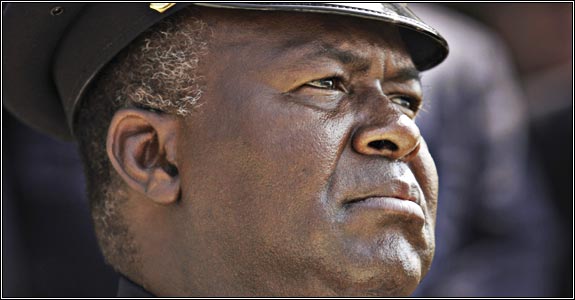
Reuben Greenberg
Let’s Take Back Our Streets
Reuben Greenberg, the longtime (23-plus years) chief of the Charleston, South Carolina, police department, retired in 2005. In the words of Charleston Post and Courier reporter David Slade, he “turned the … Police Department into a national model. In the process, he became a celebrity and a source of pride for the city.”
Reuben Greenberg was undoubtedly the ultimate “man bites dog” story, for what could be more unlikely than a black, observant Jew from Texas transforming a city in the heart of the Confederacy from a crime-ridden center of corruption to a uniquely well-managed place that cracked down on crime at the same time it virtually eliminated police brutality — and even rudeness? Greenberg told his cops that their job was not to punish (that was up to the courts), but to make arrests, and in order to do that they had to be on good terms with the citizens. Thus, he said early on in his memorable tenure, he would defend a policeman for using “excessive force” to make an arrest, but he would fire anyone who used abusive language with a citizen.
So he put his cops out on the streets, not in cars. They walked, they rode bicycles and horses, and were accessible to “normal people,” who might not have wanted to call or visit headquarters.
It worked, and Reuben soon became a media celebrity. The Los Angeles Times headlined its profile, “A Black, Jewish, Roller-Skating Cop Brings a New Way to Fight Crime to the Old South,” and even 60 Minutes gave him his 20 minutes of fame. He was in great demand by urban police forces looking for solutions to their crime problems, and it may well be that he contributed broadly to the nationwide drop in crime that we now see across the country. Although he was offered numerous high-profile and high-paying jobs, he was happy and remained in Charleston.
I met him on a trip to South Africa while apartheid still existed; during the trip there were two unforgettable events. The first came in a public meeting. Reuben was on stage with the South African interior minister, who asked Reuben what he thought about the regime’s handling of anti-racist demonstrations. Greenberg at first declined to speak, saying it was not proper for him to come to a foreign country and speak publicly about their methods, but the minister insisted, and so Greenberg laid him out. “Your men beat up demonstrators, they deliberately hurt the people for demanding their civil rights. That is not the job of police, and it guarantees that the police will not be able to do their real job, which is protecting the people from criminals. You are doing it entirely wrong, and it turns my stomach.” He was never one to mince words, once his opinions were solicited.
The other event came on a Friday night. Reuben and his wife, Sarah, needed to go to the synagogue in Johannesburg, and we went with them. As he approached the entrance, a towering Zulu guard stepped in front of him. “Sorry, sir, you can’t go in there.” “And why is that?” Greenberg asked mildly. “This place is just for Jewish people, sir.” “That’s us, we’re Jewish.”
There was no way to bridge that cultural chasm. Nothing could convince him that a black man with a Texas accent — his father was a Russian immigrant who married a black woman in Texas, where Reuben grew up — and a similarly black woman were Jewish; he had never seen such a thing, he did not believe what Reuben was saying, and he was going to do his job. But Reuben Greenberg was equally determined to pray on Shabbat. So my wife and I went inside and got the rabbi to come out and give Reuben a brief quiz on Judaism, after which we all went inside and prayed together.
I have long cherished that moment, because it reminded me of the unique nature of Americans (something the multiculturalists often forget, preferring to see us as separate communities living inside a common boundary) and Jews, who have assimilated so well because, like our countrymen, we come in all different colors from all over the world.
Reuben Greenberg is going to rest for a while, but I do not think he will ease into retirement. It isn’t his way. He’s got advanced degrees, he’s been a college professor, and he’s one of the most eloquent and charismatic speakers in America. No doubt some institution of higher learning will recognize that Greenberg’s a natural for a great university or think-tank. The next generation has as much to learn from him as we have.
